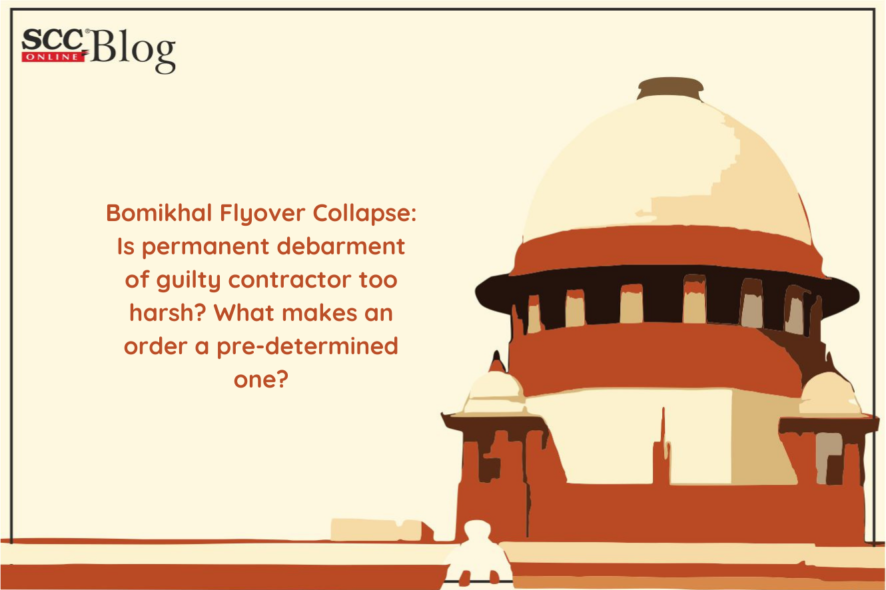Supreme Court: The Division Bench comprising of M. R. Shah* and B.V. Nagarathna, JJ., held that if a tentative decision is taken before any show cause notice is issued for any action, it cannot be said that subsequent decision was a pre-determined one. The Bench expressed,
“Merely because the show cause notice was issued after the inquiry committee report was considered and thereafter the State Government took the decision to initiate proceedings for blacklisting, that by itself it cannot be said that the order of blacklisting was predetermined as observed by the High Court.”
The respondent–contractor was awarded a contract for construction of a flyover over the railway level crossing at Bomikhal Junction in Bhubaneswar. In 2017, the constructed flyover collapsed during concreting of the railway over bridge at the level crossing, which resulted in loss of life and property including death of one person and injury to eleven others.
High-level Committee Report and Blacklisting of Contractor
A highlevel inquiry was conducted by the two member committee of Chief Engineer (Design) and Chief Engineer (DPI and Roads) which revealed following discrepancies:
- The contractor did not submit the formwork design and adopted his own arrangement leading to collapse a huge structure during construction.
- The contractor had not ensured adequate safety measures during the period of construction.
- The quality assurance had not been maintained as stipulated in the codes and manuals and as per the agreement.
- There were a lot many deficiencies in workmanship that could affect the quality of work.
On considering the committee report, the State directed that immediate necessary action be taken for blacklisting the contractor following the procedure as per the Orissa Public Works Department (OPWD) Code. Consequently, after issuing show cause notice to the contractor and going through his reply, the State government blacklisted him with immediate effect. Additionally, the contractor was banned from participating or bidding for any work to be undertaken by the Government of Odisha and also from transacting business with Government of Odisha, either directly or indirectly.
Impugned Decision of the High Court
Noticing that before a show cause notice was issued to the contractor, a communication dated 10-10-2017 was already written by the Under Secretary which showed that the Government had already ordered blacklisting of the contractor and the Engineer-in-Chief was directed to take immediate action for blacklisting the contractor, the High Court opined that the order of blacklisting was predetermined and thus was in the teeth of natural justice.
Therefore, the High Court had quashed and set aside the order of the State banning the respondent from participating or bidding for any work to be undertaken by Government of Odisha and transacting any business with Government of Odisha, either directly in the name of propriety bidder or indirectly under any different name or title. Further, the High Court also directed the State to remove the name of the respondent from the blacklist.
Whether the order of blacklisting was pre-determined?
Observing that in the communication dated 10-10-2017, it had been specifically mentioned that the action be taken for blacklisting after following the procedure as per the OPWD Code, the Bench opined that at most the order could be said to be a proposed decision to initiate the proceedings for blacklisting and not a pre-determined one. The Bench opined,
“Before any show cause notice is issued for any action when a tentative decision is taken, it cannot be said that subsequent decision followed by a show cause notice and the proceedings as per the OPWD Code can be said to be pre-determined.”
The Bench held that the action initiated against the respondent was not in a vacuum but after considering the committee’s report and after following the due procedure as required. Therefore, the High Court has erred in holding that the blacklisting order was predetermined. Further, the Bench opined that the High Court ought to have considered the seriousness of the incident in which due to omission and commission on the part of the contractor in constructing the flyover one person died and eleven others were injured and ought not to have quashed the blacklisting order.
Is there an ideal duration for blacklisting?
Noticeably, the State Government had formulated guidelines by O.M. dated 26-11-2021 which provides as under:
“The blacklisting period per offence shall be limited to 03 (Three) years subject to an overall maximum cumulative period of 10 (Ten) years for multiple offences”
Disapproving the guidelines issued by the State, the Bench opined that duration of blacklisting cannot be solely per offence. Seriousness of the lapse and the incident and/or gravity of commission and omission on the part of the contractor which led to the incident should be the relevant considerations. The Bench added,
“In a given case, it may happen that the commission and omission is very grave and because of the serious lapse and/or negligence, a major incident would have taken place. In such a case, it may be the contractor’s first offence, in such a case, the period/duration of the blacklisting/banning can be more than three years.”
However, since the said guidelines were not under challenge, the Bench abstained to interfere with the same leaving it to the State Government to suitably amend and/or modify the said office memorandum.
Conclusion
In the view of the above, the appeal was partly allowed. The Bench concluded that though the contractor did not deserve any leniency, to debar him permanently can be said to be too harsh a punishment. Hence, the duration of blacklisting was restricted to five years. The impugned judgment and order was set aside and quashed.
[State of Odisha v. Panda Infraproject Ltd., 2022 SCC OnLine SC 228, decided on 24-02-2022]
*Judgment by: Justice M.R. Shah
Appearance by:
For the State: Ashok Kumar Parija, Advocate General
For the Respondent: Sibo Sankar Misra, Advocate
Kamini Sharma, Editorial Assistant has put this report together


